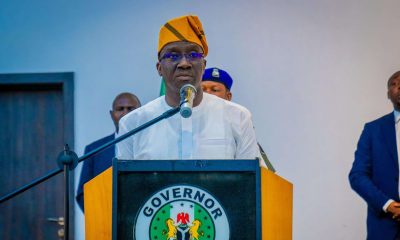Ethiopian Prime Minister Abiy Ahmed and the National Leader of the ruling All Progressives Congress (APC) in Nigeria, Asiwaju Bola Tinubu, have won African Democracy Award for their respective efforts to grow democracy and good governance on the continent.
The award was conferred on them at the 4th Africa Political Summit and Diamond Awards in Addis Ababa, the Ethiopian capital, where the two political figures were honoured for their commitments to democracy, freedom of speech, and socioeconomic and political developments of their countries.
The award was the highlight of a three-day conference on Campaign Financing and Elections in Africa, an initiative of the Association of Political Consultants – (APC) Africa, a body of assembled top political consultants from across the continent.
“This award serves to recognise and encourage icons of democracy and good governance in Africa. It has been our culture to celebrate those political figures who have done a lot to promote democracy in their respective countries,” Kehinde Bamigbetan, president of APC Africa, said in a speech at the ceremony.
Bamigbetan described Abiy as an outstanding leader who has done a lot to strengthen democracy, human rights, press freedom and peace in East Africa, citing his leniency towards Ethiopian political dissidents, his respect for and olive branch to the opposition, and his peace efforts with Eritrea and other neighbours.
“The Prime Minister won this award because of the tremendous works he has done in Ethiopia since he came on board. He opened up the political space and freed dissidents who were in jail. We also believe that a leader who has done so much to broker peace in Sudan deserves to be recognised,” Bamigbetan said.
He said the decision to recognise Tinubu followed his longstanding commitment to democracy and human rights — alongside his political shrewdness that has seen him and other opposition elements defeat the then ruling party in Nigeria, and his contributions to democratic growth in other African countries.
“Asiwaju is a political figure whose impacts have been felt not just in Nigeria, especially with the historic election of President Muhammadu Buhari on the platform of the opposition APC, but across many countries in Africa. He has continued to work to deepen democracy and good governance,” Bamigbetan said.
Firayad Mahmud, who received the award on behalf of the Prime Minister, thanked the organisers of the event and said the recognition would spur Abiy to continue to work for democracy, human rights and peace.
Tinubu, who was represented by Alhaji Mutiu Are, a member of the Governor’s Advisory Council in Lagos State, said the award was an incentive for him to continue to work for representative democracy and good governance in Nigeria and elsewhere on the continent.
“I do not take this award for granted. It is a challenge to continue to do more,” he said, commending the Lagos contingent to the conference.
The conference, which began on Monday, drew participants and speakers from across Anglophone and Francophone African and European countries, including serving and former government spokespeople and functionaries.
They included President of the European Association of Political Consultants, Igor Mintusov; President of the International Association of Political Consultants, Mehmet Ural; Board member of the European Association of Political Consultants, Dr. Reza Kazemi; Secretary-General of APC-Africa, Kipngeno Duncan Kirul (Kenya); Vice President of APC-Africa, Dianemonique Adjanoun (Benin Republic); former Information Commissioner in Ogun State, Kayode Samuel; former Lagos Information Commissioner, Steve Ayorinde; former Special Adviser on Communications in Osun State, Semiu Okanlawon; former Chief Press Secretary to the Governor of Lagos State, Habib Aruna; Chief Press Secretary to the Governor of Kwara State, Rafiu Ajakaye; and top political consultant, Ms. Temitope Lakisokun; among others.
The confab dwelt on new global trends in fundraising for elections, impacts of social media and technologies on campaign branding and merchandising, demographic trends among critical stakeholders and future of African democracies, among others.

 Health1 week ago
Health1 week ago
 Latest1 week ago
Latest1 week ago
 Health7 days ago
Health7 days ago
 Football7 days ago
Football7 days ago
 News1 week ago
News1 week ago
 Latest1 week ago
Latest1 week ago
 News1 week ago
News1 week ago
 Latest1 week ago
Latest1 week ago

